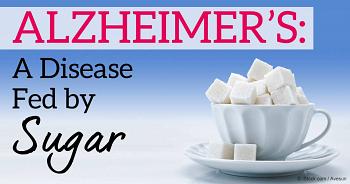Dr. Mercola: High sugar advocates high risk of Alzheimer’s
A significant number of people are becoming advocated to the risk of developing Alzheimer’s. As of 2013, 5.2 million Americans had been diagnosed with Alzheimer’s disease, a severe form of dementia, and Alzheimer’s diagnoses are projected to triple by 2050.
Over half a million Americans die from the disease each year, making it the third leading cause of death in the US, standing third behind heart disease and cancer.
There is no known cure for this disease so one may put efforts towards preventing this disease.
Dr. Richard Lipton of the Albert Einstein College of Medicine has quoted that, “Healthy aging, lifestyle changes look more promising than the drug studies so far.”
Sugar has been advocated with a high risk of developing Alzheimer’s. N 2005, this Alzheimer’s was temporarily dubbed as “diabetes type 3.” The researchers had advocated that brain produces insulin which is required for the survival of brain cells. Memory begins to fade when a toxic protein ADDL accumulates and removes insulin receptors from nerve cells. A study also demonstrated that diabetics have double the risk of developing Alzheimer’s.
Connections of Alzheimer’s with insulin resistance have been brought on the front. As reported by The Huffington Post, “Brain scans revealed that greater insulin resistance was linked to less sugar in key parts of the brain, often affected by Alzheimer's. Insulin is the hormone that helps your body use sugar from the foods you eat, and either converts it into energy or stores it away. Insulin resistance is when your body's response to a regular level of the hormone is reduced, creating a need for more insulin. If you don’t have as much fuel, you’re not going to be as adept at remembering something or doing something,’ the study's lead author Auriel Willette. This is important with Alzheimer’s disease, because over the course of the disease there is a progressive decrease in the amount of blood sugar used in certain brain regions. Those regions end up using less and less. When this happens, the study's authors believe, certain parts of the brain can't carry out complex processes, like forming memories.”
Arterial inflexibility or atherosclerosis also is associated with a specific hallmark process of Alzheimer’s, which is the buildup of beta-amyloid plaque in the brain.
According to researcher Timothy Hughes, “The process of vascular aging may predispose the brain to increased amyloid plaque buildup.”
According to Dr. Perlmutter who speaks about the association of sugars with the development of Alzheimer’s, "This notion that your brain needs sugar is really old news. Fat, specifically ketones, which your body produces by metabolizing your fat, is now called a 'brain superfuel.' There is even a pharmaceutical product; a medical food that you can write as a prescription, which raises the level of ketones or fat in the bloodstream of patients, offered up now as a treatment for Alzheimer's disease. Who knew? The point is the brain loves to burn fat. That's what we have to shift it over to."
Eating organic food, exercising and cutting back on sugars may prevent Alzheimer’s. Even intermittently fasting, avoiding mercury and aluminum environment may actually help in preventing the risk of developing Alzheimer’s.
References:
Mercola.com
JAMA Neurology July 27, 2015. doi:10.1001/jamaneurol.2015.0613v
Alzheimer’s Association 2013 Alzheimer’s Disease Facts and Figures (PDF)
Comments
There are 0 comments on this post

















